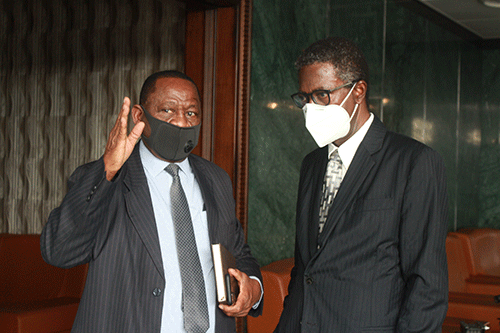Health minister Dr Kalumbi Shangula yesterday tried to tamp down fears about the local discovery of the coronavirus variant from South Africa. Laboratory results have confirmed the presence of the variant in Namibia, but Shangula said there was no need to panic.
A month ago Namibia instituted an investigation into whether the South African variant was prevalent in Namibia. The samples were taken and sent for testing to the South African national institute for communicable diseases. The specimens have since been returned from South Africa and Shangula confirmed the presence of the Covid-19 variant.
“There is no need to panic. If you look at the statistics, it doesn’t show a spike in new infections due to the variant. The sample size was so small that the conclusion can’t be relied upon. When we talk of the variant here, the sample size was small and can’t be fully relied upon. We can’t make a definite conclusion on the extent of the variant in Namibia,” Shangula said at State House yesterday during a courtesy call to President Hage Geingob from United Nations (UN) resident coordinator Sen Peng.
Shangula stressed the Covid-19 measures in place shall remain despite the new variant being present in the country.
World Health Organisation (WHO) representative in Namibia Dr Charles Sagoe-Moses said they knew all along about the variant’s presence in Namibia. “We always knew that the variant was here but we wanted evidence. The assurance is that scientific evidence is clear,” he said, while assuring Geingob on WHO’s support.
“They came out with clear recommendations. The pandemic has always been addressed here in Namibia advised by science and the choice of the vaccine. We are working with your team. You can count on us.”
Sagoe-Moses yesterday also defended the Oxford/AstraZeneca vaccine, which has not been fully rolled out in South Africa after a study showed “disappointing” results against its Covid variant. Scientists say the variant accounts for 90% of new Covid cases in that country.
The trial, involving some 2 000 people, found that the vaccine offered “minimal protection” against mild and moderate cases.
Sagoe-Moses further assured Geingob that the Oxford/AstraZeneca vaccine is used in many countries because it has been scientifically proven. Moses explained that South Africa decided to discontinue the vaccine without the scientific evidence at the time.
“Science has shown that the study in South Africa was done on a small population for that small group. They found that the variant was reduced but the original remains intact,” he said.
“All countries are using this particular vaccine. It is scientifically proven and it is being used globally. The data was not adequate and as soon as they got evidence from the scientific team, they already made their commitment to discontinue the vaccine. But countries are using it. There are other variants. We look at what works and found that it works, that is why people are using it.”
On his part, Geingob said he will contact his South African counterpart Cyril Ramaphosa on why that country has refused to use Oxford/AstraZeneca for the variant. However, he was quick to point out that it is not the time for perfection when it comes to Covid-19 vaccines because many nations are using the same doses to inoculate their people.
“I am yet to ask my brother in South Africa why that vaccine cannot be used. Do we take the vaccine? But they say, ‘don’t look for perfection’. We have to finish technicalities. These [vaccines] are all maybe from the same source. We can’t discriminate. What do we do now?” Geingob said.
As with the original version, Sagoe-Moses stated the risk is highest for people who are elderly or have significant underlying health conditions. There is no evidence the South Africa variant causes more serious illness for the vast majority of people who become infected. But there are concerns it can spread more readily and vaccines may not work quite as well against it.
A new study shows the new Pfizer-BioNTech Covid-19 vaccine is effective against the South African variant of the virus, although it generates a slightly lower immune response. The variant doesn’t make people more ill, but it does appear to be roughly 50% more transmissible than other variants.
Health experts believe the new variant to be more contagious, but there has been no indication that it affects the clinical outcomes or disease severity compared to the SARS-CoV-2 virus that has been circulating across many nations. The variant first detected last year in South Africa has now been reported in several countries.
Namibia is yet to take delivery of nearly
130 000 Oxford/AstraZeneca vaccines procured through the Covax scheme. The vaccines are expected sometime this month. The Chinese and Indian governments have also donated 100 000 and 30 000 vaccine doses respectively developed by the two countries’ companies. – anakale@nepc.com.na


